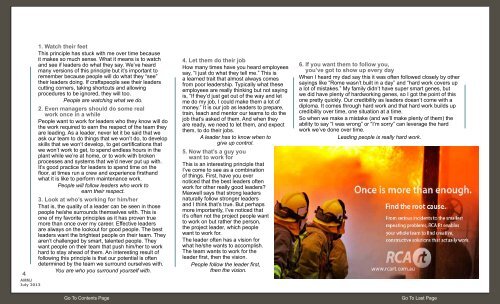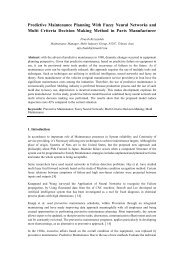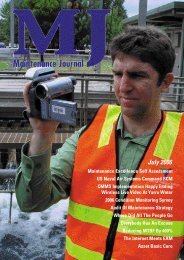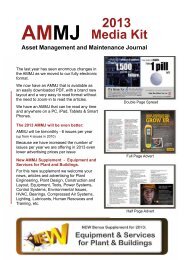Maintenance & Reliability News - Maintenance Journal
Maintenance & Reliability News - Maintenance Journal
Maintenance & Reliability News - Maintenance Journal
You also want an ePaper? Increase the reach of your titles
YUMPU automatically turns print PDFs into web optimized ePapers that Google loves.
4<br />
AMMJ<br />
July 2013<br />
1. Watch their feet<br />
This principle has stuck with me over time because<br />
it makes so much sense. What it means is to watch<br />
and see if leaders do what they say. We’ve heard<br />
many versions of this principle but it’s important to<br />
remember because people will do what they “see”<br />
their leaders doing. If craftspeople see their leaders<br />
cutting corners, taking shortcuts and allowing<br />
procedures to be ignored, they will too.<br />
People are watching what we do.<br />
2. Even managers should do some real<br />
work once in a while<br />
People want to work for leaders who they know will do<br />
the work required to earn the respect of the team they<br />
are leading. As a leader, never let it be said that we<br />
ask our team to do things that we won’t do, to develop<br />
skills that we won’t develop, to get certifications that<br />
we won’t work to get, to spend endless hours in the<br />
plant while we’re at home, or to work with broken<br />
processes and systems that we’d never put up with.<br />
It’s good practice for leaders to spend time on the<br />
floor, at times run a crew and experience firsthand<br />
what it is like to perform maintenance work.<br />
People will follow leaders who work to<br />
earn their respect.<br />
3. Look at who’s working for him/her<br />
That is, the quality of a leader can be seen in those<br />
people he/she surrounds themselves with. This is<br />
one of my favorite principles as it has proven true<br />
more than once over my career. Effective leaders<br />
are always on the lookout for good people. The best<br />
leaders want the brightest people on their team. They<br />
aren’t challenged by smart, talented people. They<br />
want people on their team that push him/her to work<br />
hard to stay ahead of them. An interesting result of<br />
following this principle is that our potential is often<br />
determined by the team we surround ourselves with.<br />
You are who you surround yourself with.<br />
4. Let them do their job<br />
How many times have you heard employees<br />
say, “I just do what they tell me.” This is<br />
a learned trait that almost always comes<br />
from poor leadership. Typically what these<br />
employees are really thinking but not saying<br />
is, “If they’d just get out of the way and let<br />
me do my job, I could make them a lot of<br />
money.” It is our job as leaders to prepare,<br />
train, teach and mentor our teams to do the<br />
job that’s asked of them. And when they<br />
are ready, we need to let them, and expect<br />
them, to do their jobs.<br />
A leader has to know when to<br />
give up control.<br />
5. Now that’s a guy you<br />
want to work for<br />
This is an interesting principle that<br />
I’ve come to see as a combination<br />
of things. First, have you ever<br />
noticed that the best leaders often<br />
work for other really good leaders?<br />
Maxwell says that strong leaders<br />
naturally follow stronger leaders<br />
and I think that’s true. But perhaps<br />
more importantly, I’ve noticed that<br />
it’s often not the project people want<br />
to work on but rather the person,<br />
the project leader, which people<br />
want to work for.<br />
The leader often has a vision for<br />
what he/she wants to accomplish.<br />
The team wants to work for the<br />
leader first, then the vision.<br />
People follow the leader first,<br />
then the vision.<br />
6. If you want them to follow you,<br />
you’ve got to show up every day<br />
When I heard my dad say this it was often followed closely by other<br />
sayings like “Rome wasn’t built in a day” and “hard work covers up<br />
a lot of mistakes.” My family didn’t have super smart genes, but<br />
we did have plenty of hardworking genes, so I got the point of this<br />
one pretty quickly. Our credibility as leaders doesn’t come with a<br />
diploma. It comes through hard work and that hard work builds up<br />
credibility over time, one situation at a time.<br />
So when we make a mistake (and we’ll make plenty of them) the<br />
ability to say “I was wrong” or “I’m sorry” can leverage the hard<br />
work we’ve done over time.<br />
Leading people is really hard work.<br />
Go To Contents Page<br />
Go To Last Page












